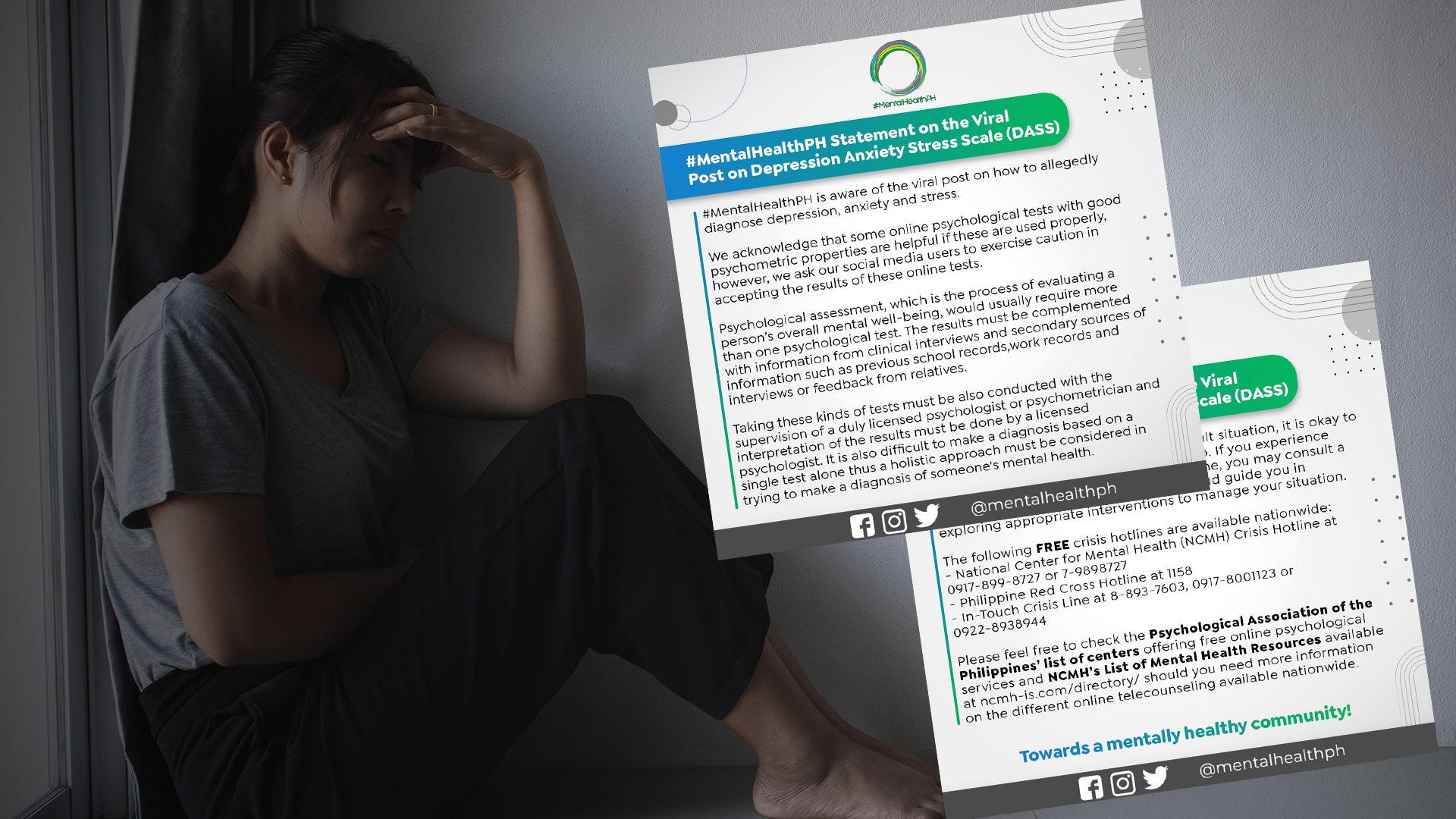SUMMARY
This is AI generated summarization, which may have errors. For context, always refer to the full article.

Advocates and a mental health expert have warned the public against using an online psychological test to self-diagnose mental health issues.
The warning came after a test called Depression Anxiety Stress Scales (DASS-42) went viral online.
The test taker is presented with 42 symptoms which they will rate depending on how much they felt these symptoms in the past week. Some of these symptoms include whether the person over-reacted to situations they encountered or if they were unable to become enthusiastic about anything.
After answering the test, the person’s depression, anxiety, and stress is given a numerical rating between the lowest possible rating of 0 to the highest which is 42 and shows a matrix where a certain depression, anxiety, or stress rating is said to be normal, mild, moderate, severe, or extremely severe.
Mental health advocate and expert Renz Christian Argao emphasized that using the online DASS-42 test alone, or without professional help, is not enough to assess a person’s overall mental well-being.
Argao is also a director and chief psychologist of the Argao Center for Psychological Services in San Fernando, Pampanga.
“The scores on a psychological test are not simply interpreted on the value alone. We consider many factors such as norms in determining what the scores mean,” Argao said in an interview with Rappler.
“DASS-42 is meant to be a measure of emotional states, a screening tool, and not a diagnostic one,” he added.
He warned the public that taking tests on their own can yield to invalid results which can lead to the wrong conclusion or diagnosis.
Some people who have taken the test – which is available online – have self-diagnosed themselves as having a certain level of depression, anxiety, or stress based on their test scores.
Argao compared taking psychological tests to other diagnostic tests which are done solely by medical professionals.
“So a severe score on depression in the test does not automatically [equate] to a depressive disorder…. You will not take a sample of your own blood and look at it through a microscope. You also need a professional to do that for you. In psychological testing, test scores alone are meaningless and can only be interpreted with the right tools, skills, and training,” Argao said.
To keep maintain one’s mental health, Argao advised the public to practice self-care activities such as taking physical and mental health breaks, doing physical exercises, having a balanced diet and enough sleep, proper time management, and doing mindfulness or meditation activities.
If you know anyone who might be feeling under the weather, Argao said the basic way to help them is to lend an ear as listening to them can “reduce the burden that someone feels.”
“Offer emotional and social support, practical assistance, and when needed, encourage them to seek professional help,” Argao said.
‘It’s okay not to be okay’
Mental health advocacy group MentalHealthPH shared this sentiment. In a statement, the group said that taking psychological tests used for diagnosing mental health problems must always be done under the supervision of a medical professional.
“Taking these kinds of tests must…be conducted with the supervision of a duly licensed psychologist or a psychometrician and interpretation of the results must be done by a licensed psychologist,” MentalHealthPH said.
MentalHealthPH added that during the pandemic, it is “okay to be not okay” and urged the public to seek professional help.
“If you experience distress or dysfunction in your daily routine, you may consult a mental health professional to help you and guide you in exploring appropriate interventions to manage your situation,” the group said.
Since April, psychological experts in the country have predicted the surge in mental health problems due to the pandemic. (Read: Can PH cope? Mental illness cases tipped to surge during pandemic)
The experts have posited that cases of anxiety and depression will spike due to the unprecedented periods of quarantine, isolation, and uncertainty amid the rising cases of COVID-19 cases in the Philippines. (Read: PH coronavirus cases now at 178,022)
Nongovernmental organizations and other groups have since offered free counselling sessions online, as well as mental health tips and explainers on social media. Meanwhile, the National Center for Mental Health’s (NCMH) crisis hotline has also remained open.
For those in need of immediate professional help, the following free crisis hotlines are available nationwide:
- NCMH Crisis Hotline: 0917-899-8727 or 7-9898727
Philippine Red Cross Hotline: 1158
In-Touch Crisis Line: 8-893-7603, 0917-800-1123, or 0922-893-8944
MentalHealthPH also advised the public to check the Psychological Association of the Philippines’ list of centers who are offering free psychological services online as well as NCMH’s list of mental health resources available through this link. —Rappler.com
Add a comment
How does this make you feel?
There are no comments yet. Add your comment to start the conversation.